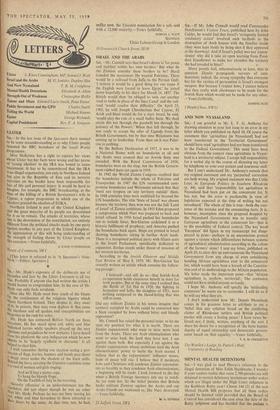AND NOW NYASALAND SIR,-1 am grateful to Mr. L. F.
G. Anthony for drawing attention in your last issue to an error in my letter which you published on April 10. Of course the statement that 'agriculture [in Nyasaland] had not been transferred to the Territorial Government' should have read 'agriculture had not been transferred to the Federal Government.' This must have been obvious from the context since agriculture in Nyasa- land is a territorial subject. I accept full responsibility for a verbal slip in the course of dictating my letter by telephone to your ever patient and courteous staff.
But I can't understand Mr. Anthony's remark that my original statement and my 'purported' correction are both wrong. My original statement was that Colin Leys, in European Politics in Southern Rhodesia (p. 44), said that 'responsibility for agriculture in Nyasaland had been put on the concurrent list. It has not, but the error is pardonable in view of legislation expected at the time of writing but not introduced.' The whole of this is true—both the exis- tence of the mistake and the extenuating facts. It is, however, incomplete since the proposal dropped by the Nyasaland Government was to transfer only European agriculture to the concurrent list—that is to the possibility of Federal control. The key-word 'European' did figure in my manuscript but disap- peared in print—perhaps in an unconscious protest against a system which differentiates between systems of agricultural administration according to the colour of the farmers' skins! I sent my letter, published on April 10, to clear this up and exonerate the ]Nyasaland Government from any charge of even considering handing African agriculture over to the concurrent list, which would have been a breach of the Constitu- tion and of its undertakings to the African population. My letter made the important point—that 'African agriculture, is, anyhow, territorial'; The confusion could not have misled anyone seriously.
I hope Mr. Anthony will specify the 'misleading comments' he wants me to reconsider. I will do so if he will say what they are.
I don't understand how Mr. Dennis Phombcah comes in his gracious letter to attribute to me a 'belief that any solution based on the conflicting claims of Rhodesian settlers and British political parties will create a lasting peace.' I have never be- lieved nor, I think, written, anything of the sort. I share his desire for a recognition of 'the basic human dignity of equal citizenship and democratic govern- ment based on that equality.'—Yours faithfully, T. R. M. CREIGHTON
The Warden's Lodge, St. Patrick's Hall, University of Reading


































 Previous page
Previous page